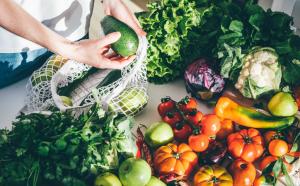Cancer and Diet: How Are They Related?

Although the causes of this disease are complex and can’t be boiled down to just what we eat, there is an important link between cancer and diet. Here, we will go over the main recommendations of experts.
Our body continuously renews its cells to replace old or dead cells. In some cases, this process can be altered and produce “immortal” cells that build up in the tissues, resulting in tumors.
Tumors can be benign (not cancer) or malignant. In a malignant tumor, harmful cells can spread throughout the body and invade other tissues, a phenomenon known as metastasis.
Some risky behaviors can increase the likelihood of developing cancer. The most common ones are:
- Poor diet.
- Tobacco use.
- Alcohol use.
- Physical inactivity.
- Exposure to contaminants.
Several studies have found that up to 50% of cancers may be related to diet. Leaving aside specific discussions on the link between cancer and diet, some dietary habits are unanimously considered to be helpful in preventing cancer:
- Eating fruits, vegetables, legumes, and grains. Get at least 400 g every day of fruits and vegetables, which should make up over 10% of your daily energy intake. Eating a variety of them and including foods that are in season may boost the benefits.
- Grains and root vegetables should make up at least 50% of your daily energy intake. You should also increase your fiber consumption to improve your bowel function and reduce the time that carcinogens spend in contact with your intestinal wall.
- Sugars should make up less than 10% of your daily energy intake.
- Reduce the portion sizes of and the frequency you eat meat (under 70 g each day), or replace it with fish or poultry. You should also limit consumption of salted, smoked, and cured foods and nitrate preservatives.
- Fats should not make up more than 30% of your daily energy intake, with most coming from unsaturated fats. That percentage can increase to 35% if you mostly consume monounsaturated fats (such as olive oil, avocado, and nuts).
- Regularly include low- or moderate-fat dairy products.
- Avoid micronutrient deficiencies, and pay special attention to your intake of antioxidants (vitamins C and E, beta-carotene, and selenium) and folate, calcium, and zinc.
- Consume under 5 g of salt in total every day.
- Eat perishable foods promptly, or refrigerate or freeze them.
- Do not cook at very high temperatures. Prepare foods by boiling or steaming instead of frying or grilling.
- If you drink alcohol, do so in moderation. Limit intake to no more than one drink a day for women and no more than two for men. A drink is defined as 12 ounces (350 mL) of beer, 5 ounces (150 mL) of wine, or 1.5 ounces (45 mL) of distilled liquor.
In addition to these dietary measures, there are other lifestyle habits you should include:
- Do not smoke.
- Maintain a healthy weight.
- Do regular physical activity.
- Avoid prolonged sun exposure.
- Get regular health checkups. Remember, cancer treatments are most effective in the early stages of the disease.
Diet during cancer treatment
Nutrition is an important part of cancer treatment. Eating the types of foods mentioned above before, during, and after treatment can help you feel better and stay stronger.
Experts say that you should keep the above list of tips in mind during cancer treatment, but you might also find the following helpful:
• Split up meals into 6 or 10 meals a day.
• Eat the biggest meal when you have the greatest appetite (for example, in the morning).
• Eat lukewarm or room-temperature foods.
• If necessary, change the texture and consistency of foods.
• Change the seasoning or way you prepare foods; for example, reduce the use of salt or pepper, and boil foods instead of frying or grilling them.
• Eliminate or limit red meat and foods that cause gas.
• Don’t neglect your hydration. Drink between 2 and 2.5 liters (67 to 84 ounces) of water every day.
• A health care professional may recommend the use of calorie or protein supplements, if necessary.
Cancer statistics
Cancer is the leading cause of death worldwide, according to the World Health Organization (WHO). In 2020, this disease caused almost 10 million deaths, 713,414 of which occurred in Latin America and the Caribbean.
At the same time, over 1,470,274 new cancer cases were recorded in the region. The most common types are:
- Prostate (214,522 cases).
- Breast (210,100 cases).
- Colorectal (134,943 cases).
- Lung (97,601 cases).
- Stomach (67,617 cases).
Sources:
National Library of Medicine;
Global Cancer Observatory (Globocan);
World Health Organization (WHO);
American Cancer Society (ACS);
Robles-Agudo, F., Sanz-Segovia, F., López-Arrieta, J.M., Beltrán, M. (2005). Alimentación y Cáncer [Diet and Cancer]. Revista Española de Geriatría y Gerontología.
© 2025 Pan-American Life
